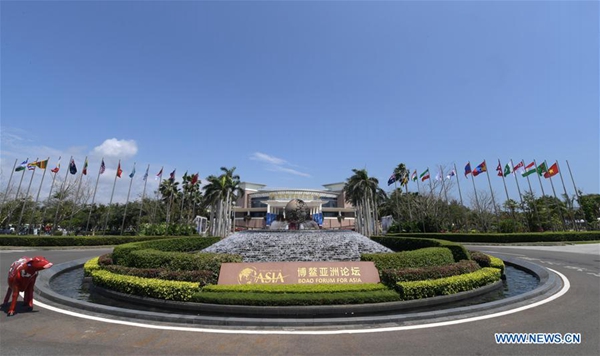2017 Boao forum: A welcome projection of soft power
- By Tim Collard
 0 Comment(s)
0 Comment(s) Print
Print E-mail China.org.cn, April 1, 2017
E-mail China.org.cn, April 1, 2017
|
|
|
Photo taken on March 22, 2017 shows the conference site of the Boao Forum for Asia Annual Conference (BFA) in Boao, south China's Hainan Province. The 2017 BFA will be held from March 23 to 26 this year. (Xinhua/Yang Guanyu) |
China has many ways of making her views known and projecting her influence in both hard and soft ways.
Its pursuit of bilateral and multilateral diplomacy is characterized by two elements: a determination to conduct international relations on a non-threatening and non-confrontational basis, and an understanding that good international relations are best underpinned by mutually beneficial economic cooperation.
The annual hosting of the Boao Forum for Asia, in one of the country's most beautiful resorts on the island of Hainan, obviously functions as an invitation to mainly non-governmental representatives of its Asian neighbors to get behind China's attempts to raise the economic status of the region.
As such, it is a tremendous example of the projection of soft power in an exercise of influence without control.
The principal product of this year's forum was the BFA Declaration on Economic Globalization. This took the form of a resounding multilateral commitment to global free trade, coming at a time when "globalization" has almost become a dirty word in parts of the West.
China has taken up the banner that appears to have been laid down by free trade's traditional proponents, the U.S. and Europe. This commitment has been a flagship policy of the Chinese administration which took office in 2012 under President Xi Jinping.
As well as regular firm statements by President Xi and Premier Li Keqiang, this commitment has been underpinned by practical policies such as the Belt and Road initiative creating and reinforcing the physical infrastructure of East Asia and trading partners further afield, and the AIIB financially underpinning the program.
The principal elements of the declaration began with an expression of alarm at the recent growth in mercantilist and protectionist sentiment as a response to current economic difficulties, and an assertion that these ideas have no place in Asia's economic development.
A preamble to the BFA Declaration stated: "Asian countries should stay committed to the course of open markets, inclusive growth and continued economic cooperation to ensure shared prosperity and sustainable growth in the region."
The response to the inevitable problems of globalization should not be a retreat from free trade, but ongoing reforms in global governance, especially trading practices.
This will require official recognition that globalization is a positive economic force, and redoubling of efforts to reform and strengthen the international economic order by means of dialogue and cooperation, with no derogation from national economic sovereignty.
Liberalization of cross-border trade and investment should be recognized as the driver of sustainable global development, and protectionism should be roundly rejected.
International trade and investment mechanisms should be constantly improved through negotiation. Governments should jointly uphold and promote trade and investment liberalization and facilitation, and continue to reform and improve multilateral trade and investment mechanisms and their governance to ensure global prosperity.
It was established at the forum that more than half of the existing free trade agreements and regional trade agreements are not actually functioning. Thus, it was about time umbrella organizations such as the WTO and APEC addressed the situation, and worked towards a more open and inclusive multilateral trade system in which agreements reached are actually honored in practice.
International financial institutions should also be upping their game. Cross-border capital flows should be supported and facilitated as essential drivers of economic growth, and irresponsible speculation or arbitrage discouraged.
Technological innovation, in which Asia is well able to keep up with Western countries, and cross-border cooperation in knowledge and information (in which further progress is necessary) have contributed to the narrowing of the North-South development gap.
However, there is further scope for developing various forms of cross-border public private partnerships (PPP).
All this is implied in existing international agreements; however, clearly there have been obstacles to practical implementation which might escape notice were it not for the work of sub-governmental contacts like those which are facilitated and furthered by such forums as that in Boao.
The Boao Forum for Asia, which operates below the level of inter-state agreements, is excellently positioned to monitor how these are actually implemented in practice.
China, by taking an active interest at this level, shows a deep commitment to a genuine revival of trade in hitherto neglected regions and thus to replicating across the region the astounding success in poverty alleviation from which the people of China have benefited over the last four decades.
Tim Collard is a columnist with China.org.cn. For more information please visit:
http://www.china.org.cn/opinion/timcollard.htm
Opinion articles reflect the views of their authors, not necessarily those of China.org.cn.







Go to Forum >>0 Comment(s)